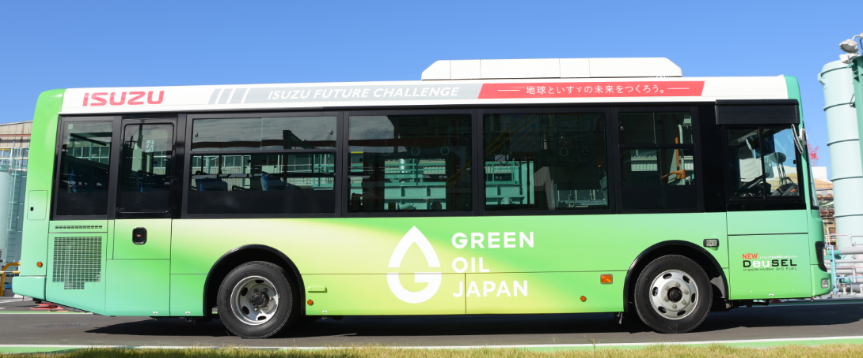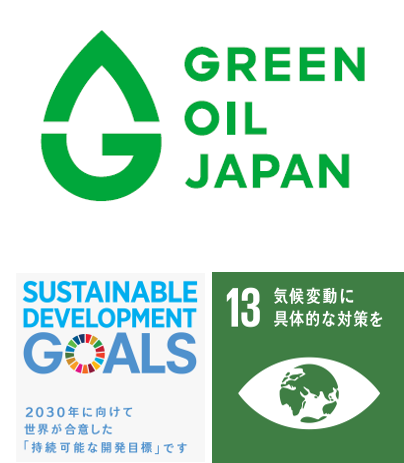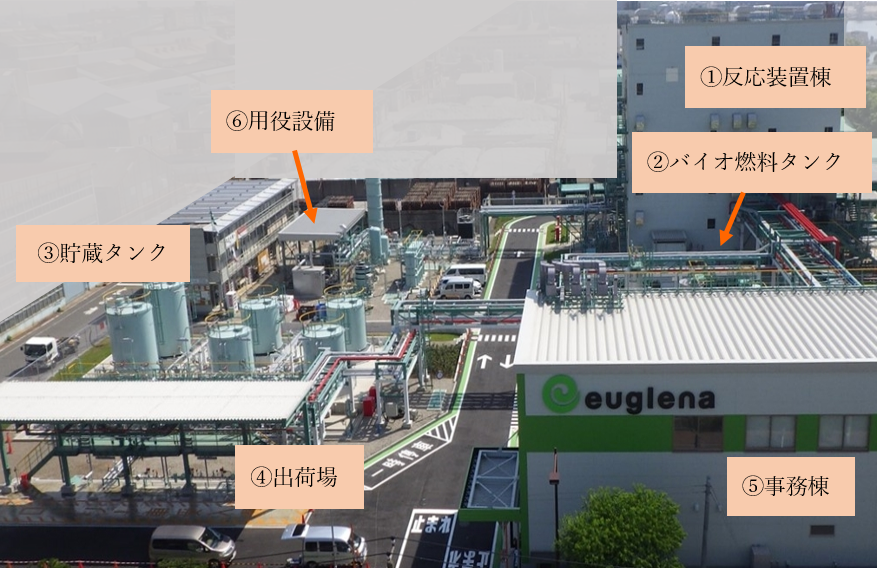ニュースリリース
※ ニュースリリースは発表当時の内容を掲載しており、最新の情報とは異なる場合がありますためご注意ください。
ユーグレナ社、日本初のバイオジェット・ディーゼル燃料製造実証プラントが完成、
日本をバイオ燃料先進国にすることを目指す『GREEN OIL JAPAN』を宣言
~2019年夏の次世代バイオディーゼル燃料供給開始、2020年バイオジェット燃料での有償飛行実現で、
SDGs「GOAL13:気候変動に具体的な対策を」に貢献も~
株式会社ユーグレナ
株式会社ユーグレナ(本社:東京都港区、社長:出雲充)は、横浜市鶴見区の京浜臨海部において日本初のバイオジェット・ディーゼル燃料製造実証プラント(以下実証プラント)を2018年10月31日に竣工し、横浜市、千代田化工建設株式会社(以下千代田化工建設)、伊藤忠エネクス株式会社(以下伊藤忠エネクス)、いすゞ自動車株式会社(以下いすゞ自動車)、ANAホールディングス株式会社(以下ANAホールディングス)、ひろしま自動車産学官連携推進会議(以下ひろ自連)の協力のもと、SDGs (国連サミットにて採択された持続可能な開発目標)※1 の「GOAL(目標)13:気候変動に具体的な対策を」に貢献する取り組みとして、日本をバイオ燃料先進国にすることを目指す『GREEN OIL JAPAN(グリーンオイルジャパン)』を新たに宣言することをお知らせします。
※1:2015年9月の国連サミットにて、国連加盟193か国が2016年~2030年の15年間で達成するために掲げた、「貧困に終止符を打ち、地球を保護し、すべての人が平和と豊かさを享受できるようにすることを目指す普遍的な行動」の目標。

世界におけるバイオ燃料の普及と日本の状況について
2015年9月に国連サミットで制定されたSDGsでは、「GOAL13:気候変動に具体的な対策を」が掲げられています。また、2015年12月に国連気候変動枠組条約締約国会議(COP)で合意された、2020年以降の気候変動問題に関する国際的な枠組みである「パリ協定」では、2030年までにCO2を主とする温室効果ガスの排出を2013年の水準から26%削減することが日本の目標となっています。
そのような中、日本も加盟する国際民間航空機関(ICAO)では、2016年総会にて、2020年以降CO2排出量を増やさないことが加盟国間で合意され、その対策として有望視されているバイオジェット燃料の導入は、米国、EU主要国、カナダやオーストラリアのほか、シンガポール、タイ、中国やインドといったアジアの国々で進んでいます。一方日本では、バイオジェット燃料を使用した有償飛行は実現しておらず、世界主要国に対してバイオジェット燃料の導入は遅れているのが現状です。
自動車用バイオ燃料については、米国では2022年までに約18%※2、EU各国では2020年までに10%、自動車用燃料全体の内訳として使用することが目標※3とされていますが、日本ではガソリンとディーゼル代替のバイオ燃料の導入目標は2022年までで年間数%程度※4に留まっています。
日本初のバイオジェット・ディーゼル燃料製造実証プラントの完成について
世界でバイオ燃料の導入が進む中、当社では、2015 年12 月1 日に横浜市、千代田化工建設、伊藤忠エネクス、いすゞ自動車とANAホールディングスの協力のもと、2020 年に向けた国産バイオジェット・ディーゼル燃料の実用化計画(以下「国産バイオ燃料計画」)の始動を発表しました。そして、2017年6月1日に日本初のバイオジェット・ディーゼル燃料の実証プラント建設に着工し、2018年10月31日に竣工を迎えました。なお、実証プラントは2019年春より本格稼働し、微細藻類ミドリムシ(学名:ユーグレナ)や廃食油を主原料としたバイオジェット・ディーゼル燃料の製造を開始する予定です。
2020年目途の国産バイオジェット燃料有償飛行と2019年夏の次世代バイオディーゼル燃料供給開始
今回完成した実証プラントで製造する国産バイオジェット燃料での有償飛行を、2020年までに実現するほか、2019年夏からは実証プラントで製造した次世代バイオディーゼル※5燃料の供給を開始します。
次世代バイオディーゼル燃料は、2014年6月より当社といすゞ自動車と共同で取り組んでいる「次世代バイオディーゼルの実用化に関する研究」の一環で、実証プラントと同様の原料および精製方法により製造した次世代バイオディーゼル燃料を用いた性能試験を実施し、エンジンに変更は加えずに含有率100%※6で使用することができることを確認しました※7。この結果を受けて、いすゞ自動車では2018年12月より、次世代バイオディーゼル燃料を含有した燃料を用いて、いすゞ自動車藤沢工場と湘南台駅間シャトルバスの定期運行による実証走行を開始します。
いすゞ自動車の『GREEN OIL JAPAN』宣言ラッピングバス
日本をバイオ燃料先進国にする新宣言『GREEN OIL JAPAN』について
 世界に遅れを取る日本のバイオ燃料の導入状況に対し、当社では今回の実証プラント竣工を機に、「国産バイオ燃料計画」をともに取り組んできた横浜市、千代田化工建設、伊藤忠エネクス、いすゞ自動車、ANAホールディングス、ひろ自連(2018年6月より参加)との連携をさらに進化させ、「日本をバイオ燃料先進国にする」を合言葉とする、『GREEN OIL JAPAN』を宣言します。
世界に遅れを取る日本のバイオ燃料の導入状況に対し、当社では今回の実証プラント竣工を機に、「国産バイオ燃料計画」をともに取り組んできた横浜市、千代田化工建設、伊藤忠エネクス、いすゞ自動車、ANAホールディングス、ひろ自連(2018年6月より参加)との連携をさらに進化させ、「日本をバイオ燃料先進国にする」を合言葉とする、『GREEN OIL JAPAN』を宣言します。
『GREEN OIL JAPAN』宣言では、2020年までに実証プラントで製造したバイオ燃料を陸・海・空における移動体に導入し、2030年までにバイオ燃料を製造・使用するサポーターを日本中に広げることでバイオ燃料事業を産業として確立することを目標に掲げ、この目標実現を通じてSDGs「GOAL13:気候変動に具体的な対策を」への貢献に取り組みます。そのために当社は、2025年までに25万KL/年のバイオジェット・ディーゼル燃料を100円/Lで製造する商業生産体制を整え、2030年までにバイオ燃料100万KL/年を供給することを目指します。
なお、当社では、『GREEN OIL JAPAN』宣言を支援し、バイオ燃料の利用、原料の供給やバイオ燃料の普及などをともに実施する協力団体・企業を募ります。
・『GREEN OIL JAPAN』宣言 http://euglena.jp/greenoiljapan
今後も当社は、社会的な課題解決に寄与し、持続可能な未来づくりに貢献してまいります。
詳細は以下の通りです。
※2:米国のバイオ燃料導入目標は、2022年に360億ガロンと設定されており、当社試算によると米国の輸送用燃料全体の約20%にあたる。
※3:「平成26年度石油産業体制等調査研究 (バイオ燃料に関する諸外国の動向と持続可能性基 準の制度運用等に関する調査)報告書」(株式会社三菱総合研究所)より。
※4:「バイオ燃料の導入に係る 高度化法告示の検討状況について」(資源エネルギー庁 資源・燃料部 政策課)より。
※5:含有率100%でも車両のエンジンに負担をかけることなく使用することができるバイオディーゼル燃料。
※6:添加剤(化石燃料でも使用されているもの)は除く。
※7:初期性能としての確認であり、耐久性については、今後の実証走行により確認する予定。
<日本初のバイオジェット・ディーゼル燃料製造実証プラントと『GREEN OIL JAPAN』宣言について>
■バイオジェット・ディーゼル燃料製造実証プラントの概要
場所 :神奈川県横浜市鶴見区末広町1丁目1(AGC株式会社 京浜工場内)
敷地面積 :7,787.6㎡
製造能力 :日産5バレル
製造量 :年産125KL(試験の実施状況および保守の発生状況等により数量は変動)
製造品目 :バイオジェット燃料、次世代バイオディーゼル燃料、バイオナフサなど
製造技術 :Biofuels ISOCONVERSION Process(通称:BICプロセス)
※Chevron Lummus Global / ARA社よりライセンス供与
投資総額 :約58億円(神奈川県および横浜市からの助成含む)

①反応装置棟:原料(ミドリムシ油脂や廃食油)からバイオジェット燃料とバイオディーゼル燃料を製造する設備。
②バイオ燃料タンク:製造したバイオジェット燃料、ディーゼル燃料を貯めるタンク。
③貯蔵タンク:バイオジェット燃料、バイオディーゼル燃料をそれぞれ石油系燃料と混ぜた燃料を貯めるタンク。
④出荷場:完成したバイオ燃料を出荷する設備。
⑤事務棟:実証プラント内の遠隔操作や、実証プラント内の管理・運営をするオフィスが入る。
⑥用役設備:実証プラントに蒸気、圧縮空気など供給する設備。
■『GREEN OIL JAPAN』宣言について
「日本をバイオ燃料先進国に」を合言葉に、日本におけるバイオ燃料の実用化普及を目指す活動宣言です。なお、『GREEN OIL JAPAN』宣言は、SDGsの「GOAL13:気候変動に具体的な対策を」に合致する宣言として取り組みます。
当社では、『GREEN OIL JAPAN』宣言に賛同し、バイオ燃料の利用、原料の供給やバイオ燃料の普及支援などをともに実施、普及する協力企業(輸送関連、飲食関連、地方自治体など)を募ります。
HP:http://euglena.jp/greenoiljapan 「GREEN OIL JAPANに関するお問い合わせ」
■各社の今後の役割について
ユーグレナ社 :ミドリムシ油脂の供給、実証プラントの運転、バイオジェット・ディーゼル燃料の供給
横浜市 :横浜市内でのバイオ燃料普及に向けた取り組みへの支援
千代田化工建設:建設現場でのバイオ燃料利用検討、商業プラントの技術検討支援
伊藤忠エネクス:バイオマス原料の調達、同社グループ内でのバイオ燃料利用検討、同社給油所ネットワークを通じた次世代バイオ燃料の供給検討
いすゞ自動車 :次世代バイオディーゼルの実証利用による継続評価
ANAホールディングス:バイオジェット燃料でのフライト実施に向けた開発協力、同社グループ内での次世代バイオディーゼル燃料の利用検討
ひろ自連 :ひろしま”Your Green Fuel”プロジェクトの実行(広島における自動車用次世代バイオ燃料の地産地消モデル構築)
■株式会社ユーグレナのバイオ燃料について
バイオ燃料は、既存の化石燃料と比べると理論上CO2排出量が少ない再生可能な液体燃料であり、欧米を中心に世界中で普及が進んでいます。一方、従来型のバイオ燃料は、トウモロコシやサトウキビ、大豆、パームといった作物を主な原料とするため、食料との競合や、森林破壊にともなう温室効果ガスの増加といった問題などが指摘されています。
当社が製造するバイオジェット・ディーゼル燃料は、ミドリムシ油脂や廃食油などを主原料とすることで、食料との競合や森林破壊といった問題を起こさず持続可能性に優れた燃料となることが期待されています。また、化石燃料を使用している既存のエンジンに問題なく適用可能であり、水素や電気といった代替エネルギーへの移行に必要とされる多大なインフラコストもかからないため、石油使用が多い現代社会において、既存インフラを維持しながら効率的に普及し、利用が拡大する可能性があります。
■株式会社ユーグレナ社について
2005 年に世界で初めて石垣島で微細藻類ミドリムシ(学名:ユーグレナ)の食用屋外大量培養技術の確立に成功。石垣島で生産したミドリムシ・クロレラなどを活用した機能性食品、化粧品等の開発・販売を行うほか、バイオ燃料の生産に向けた研究を行っています。2012 年 12 月東証マザーズに上場。2014 年 12 月に東証一部市場変更。経営理念は「人と地球を健康にする」。
■その他
添付:当日発表関連資料
以上
―報道関係者お問い合わせ先―
株式会社ユーグレナ コーポレートコミュニケーション課
